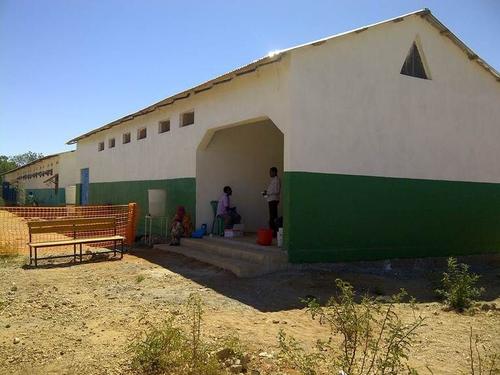A joyful mother, a rejoicing family and village welcomed Ahmed to the world. Born to 21-year-old Halima Ashir, Ahmed looked healthy and happy. Halima’s joy was however short-lived as just two weeks after delivery, she started observing an unusual increase in the size of Ahmed’s head. She couldn’t believe what she was seeing. She spent days and nights worrying about this unknown phenomenon. She had never seen or heard anything this weird. She tried to hide the child with blanket whenever people came to visit but a child cannot be hidden forever. Slowly, the story of Ahmed’s head was the talk of the village. It was believed that evil spirits had possessed the child, and witchdoctors had to be summoned to get rid of them.
After about four weeks with no success, some villagers suggested that Ahmed be taken to hospital. So, they set-off for Degehbur hospital, where MSF works, about 100km from their rural village of Ajuwaj. Since 2007, MSF has been supporting the Ministry of Health by providing a broad range of healthcare services including emergency obstetric care, antenatal consultations, newborn care, treatment of malnutrition, malaria and tuberculosis, and mental health support.
Hydrocephalus was the diagnosis of the MSF team. They explained to Halima and her husband, Mohammed that their son’s condition was as a result of the build-up of too much cerebrospinal fluid in the brain. And they also told them it should be properly diagnosed through clinical neurological evaluation and by using cranial imaging techniques such as ultrasonography, CT, MRI, or pressure-monitoring techniques, which were not available in the Degehbur Hospital but in Addis Ababa. The family was referred to Addis Ababa for further treatment.
“It took MSF’s support and two operations to manage Ahmed’s problem,” says Ruth Tesfaye, MSF referral nurse in Addis Ababa. “Hydrocephalus is often treated by surgically inserting a shunt system that helps the system to divert the fluid from the head to the lower area of the body to be absorbed as part of the normal circulatory process,” she explains.
MSF’s medical team has been following the treatment of the child and has noted that Ahmed is now a cheerful and healthy child. And that the size of his head has significantly reduced.
After a long journey seeking a miracle for her child, Halima is relieved from anxiety at last. Throughout the entire period, MSF provided accommodation, food, transportation and psychological support to Halima and her son. Staring at her playful son, Halima remarks, “I felt the sparkle of my child’s life return after talking to the MSF team in Degehbur. Now, my child’s soul is finally calm thanks to MSF. I have no words to express my gratitude to them. They are saving the lives of many children. I just want to say that may Allah repay their kindness!”
About Hydrocephalus
Hydrocephalus affects about one in every 500 children. There are two kinds of hydrocephalus; congenital and acquired hydrocephalus. Congenital hydrocephalus occurs at birth. It is mainly identified by an unusually large head. Causes may include genetic problems and defects in how the foetus develops. Acquired hydrocephalus can occur at any age. Triggers for the problem may include head injuries, strokes, infections, tumours and bleeding in the brain. In Ahmed’s case, it was congenital.
Snapshot of Degehbur Project
Since November 2007, MSF Spain has been providing a full range of free medical assistance to the vulnerable population of Degehbur zone with no access to healthcare. In Degehbur Hospital, MSF provides primary and secondary healthcare activities including emergency referrals, inpatient care for children under five years old and nutritional and TB support. The outreach team is active in Degehbur, Birqod and Ararso districts supporting 13 health facilities. Two mobile outreach teams conduct vaccinations, nutritional screening, out-patient medical consultations and referrals of complicated cases to Degehbur Hospital and further to Jijiga hospital or Addis Ababa when necessary ( since January 2014, 142 patients have been referred). The organisation has built a 35-bed ward in the hospital to enhance treatment of children with acute malnutrition and related complications. Routine vaccinations were administrated to 4,474 children between January and July 2014.



